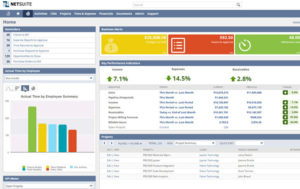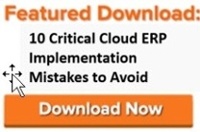

In every growing business, it’s important to have access to real-time, relevant and analytical data. The ideal ERP dashboard provides you with a visual workspace much like the dashboard in your car. Real-time dashboards provide you with instant, uninterrupted access to accurate information, to view the data you need to make decisions. It’s also important to have the ability to edit records at the touch of a button. Whether you just need a holistic overview, or the ability to drill down into greater detail, a robust integrated cloud ERP system will help you adjust accordingly and accomplish your goals.
Here are 3 Essential Dashboards You Get with an Integrated Cloud ERP System
- Primary Dashboards - Your primary ERP dashboard should serve as a one-stop shop overview of your key metrics like sales trends, profitability, current inventory count, purchase order approval, or sales rep comparisons. The critical feature is the ability to quickly see and gauge what is going on within your area of responsibility.
- Departmental Dashboards – An integrated cloud ERP system, like NetSuite, also allows you to create more focused dashboards for granular insight. Get the details on the performance by department to learn where your company may be challenged. You have the ability to easily create customized dashboards for sales and revenue to help your team monitor information by sales rep, item, customer or margins. Department heads can organize dashboards to monitor how expenses are trending, compare last month’s payables to this month’s, display vendor balances or compare cash to expenses. If you need a specific view by job function, this is easily accomplished. For instance, a Human Resources view helps examine payable commissions, employee headcount or sales by employee. You control who is able to modify dashboards for those metrics as well.
- Customer & Vendor Dashboards - For even more insight into your customer base, it's easy to create a customer dashboard view that shows what your customers have purchased, potentially revealing new sales opportunities. You may also create dashboards that show frequency of customer service calls to pinpoint product or service issues. Vendor dashboards to provide your purchasing department with the ability to view details about each vendor including payment terms, location of inventory, timeliness, contact information and reliability.
Integrated Cloud ERP Systems Help Track Trends with Key Performance Indicators (KPIs)
Large amounts of data can be overwhelming. An integrated cloud ERP system and its dashboards can do the number crunching for you. You’ll spend more time learning from and acting on key data and less time assembling it.
- Within your dashboard, view sales trend graphs for any time period – daily, weekly, monthly, quarterly, yearly. Evaluate current versus historic data for any key items you need to analyze.
- Scorecards offer many options for the calculation and display of KPI data and can provide complex assessments among multiple KPIs over multiple date ranges or accounting periods. You can even create custom KPIs based on custom reports for whatever you’d like to see. Financial ratios, vendor performance, purchase orders over time and customer-specific data such as the number of new customers are just a few of the scorecards you can produce.
- Report snapshots show summary data from one of many pre-built reports on your dashboard. Report snapshots can be used for standard reports that you access most frequently and have the biggest impact on your business. You can click through to the underlying detail for more information.
These key elements – trend graphs, KPI scorecards and snapshots – bring relevant, real-time data directly to your dashboard so you can easily gauge, monitor and manage your business.
A Robust and Integrated Cloud ERP System Offers:
- Drill down ability. Graphically view key metrics, but take a closer look at the information by clicking and drilling to view the numbers. You can click all the way to the originating transaction for a micro view.
- Add elements and arrange them as you and your team will use them. Tailor your dashboard to reflect what’s important to you and your roles and responsibilities.
- The ability to create standardized dashboards. For example, create and publish a sales rep dashboard so each team member is working from the same metrics
A robust, integrated cloud ERP solution can and should provide you with all these features right out of the box.
There is so much data about your business for you to harness and use to your advantage. Contact goVirtualOffice to learn more about how you and your company can benefit from a robust, integrated ERP system. As NetSuite consultants, our team at goVirtualOffice, helps CFOs, Owners, Controllers, Accountants and IT managers with a fit assessment to decide if NetSuite is the right solution for some or all of your business needs. Contact us or email or call 888-773-2123 today!
goVirtualOffice
Focusing on NetSuite since 2005, our team is one of the top NetSuite companies in the world. How is this possible? We focus on you! Contact us or email or call 888-773-2123 today and we’ll help you see if NetSuite is the right solution for some or all of your business needs.
NetSuite is an integrated cloud-based Enterprise Resource Planning (ERP) platform that enables organizations to grow and unify their departments. Its built-in flexibility, real-time business intelligence, commerce-ready platform is designed for a modern company. NetSuite lowers costs and reduces hassle for IT. One platform spanning back office financials to customer records to professional services provides visibility and simplified integration.
Another version was previously published on goVirtualOffice’s Blog by Dirk Shimpach on May 31, 2017 - THE DASHBOARD: GET INSIGHTS WITH TREND GRAPHS, KPIs, REPOST SNAPSHOTS AND SCORECARDS
